QuestionHi! I recently purchased a 6 month old tiel from a breeder who had to stop breeding due to allergies. Because of her allergies the birds were kept in a heated garage and had very little human interaction. I am not even sure if he was hand fed. He is very scared of me and I have been working with him in a towel and talking to him. Do birds this wild ever become tame? Do you have any special tricks to help me tame him?
Answerhi. thanks for your question. my guess is that if you purchased him from a breeder, that he is handfed/handraised or at the very least, he is used to some human interaction and not "wild" per se. i think you are correct in your assumption that his lack of human interaction has led him to be frightened of you.
the good news is that your 'tiel is young and that it is never too late to try and get him accustomed to you and human interaction in general. kudos to you for trying to work with him and get him accustomed to you! it will take some time and patience but will be a very rewarding experience for the both of you! i am going to give you an excerpt from a prior answer that i gave a questioner regarding a similar situation with her lovebird named "Roxy":
"It is natural for a bird to be nervous in a new environment...she is in a new place with new people in a new cage without her old "flock". Remember you or your child's (if you have any:) first day of school? It'll be rough for a little while but with proper hand training, she can become more comfortable with you.
Hopefully she was handraised by humans as this will make the taming process easier. She will have already been used to handling, care, and the company of humans. However, this isn't a sure thing...I've seen many a handraised bird be a "bad apple" and I've also seen parent raised birds become tame just fine.
You will have to spend time getting Roxy "used" to you and her new environment. Perhaps spending about 10-15 minutes, spread out over a few times a day (to keep her from being tired or overly stressed) at first. Remember throughout the process to use positive reinforcement...have her repeat what she did a few times and then use verbal praise and treats. When you feed and water her, move slowly and try not to speak loudly or scare her in any way. Like you said, the birds were huddled together on the bottom of the cage so she may continue that behavior for a little while. Make sure food and water is in the reach of her "comfort zone" if she is demonstrating that behavior.
At first she'll be scared of you, so just sit next the cage...perhaps put it next to you while you watch TV, read, pay bills...occasionally acknowledging her by looking at her and saying her name in a calm "mommy" voice. That will help her to understand that when you say "Roxy" that you are speaking to her. Hopefully she will then look at you when you call her name, sort of like how dogs do. She should then start looking forward to your attention. Once this happens...it should be okay to start hand training her. All birds move at their own pace and there isn't really a "timeline" for when a bird is ready for hand training.
You may want to initiate training by tempting her with food...whatever she likes, like millet. Try this "handfeeding" until she is used to the idea of having your hand in her cage. This step could take a while and that is okay. it will help her also to not be scared of you when you are simply trying to change her food/water.
Keep doing this until she lets you pet her...try petting her chest/breast area first because your hand going for her head may scare her. Also, most birds don't like being pet on the wings or legs. When she gets used to you touching her in that area (which may also take some time, remember, baby steps) you can try pressing on her tummy a little bit as a cue for her to step up onto her finger. Birds usually like stepping up and being higher than they are so make sure your hand is placed up higher than her feet. Sometimes birds will automatically place on foot up...another gentle push will cue her to step up again! This may take time and also may result in her jumping off or being scared. She might also try and bite at this time. It may be a "test bite" as she is testing to see with her beak if your finger is a solid enough place for her to stand...not really a bite at all but more like her way of checking things out. She may also bite out of fear. Either way, when you are successful or if she bites, try not to make too much noise...even if its praise. Continue to speak softly and make slow movements, even if she bites. I know its hard but if she knows she can keep you away from her by biting, she will continue to do that.
As you start getting her to step on your finger, still keep her in the cage, just on your finger. Try not to pull her out of the cage quickly. Eventually, after a few times on your finger, you can slowly take her out of the cage. She may get scared and jump or fly back in the first few times. If she gets too scared and starts flying around the room, remain calm when you pick her up...she should jump right on to your finger out of fear of being out of her cage.
I hope this helps...just remember to remain calm and keep distractions to a minimum as she will be very shy at first. Make sure that there aren't hazards in the room you are doing your training in in case she does fly around the room disoriented. Eventually, she may climb all the way up to your shoulder! Alot of birds do this instinctively as they like climbing and being up at the top of things. Just note that if she does go up there...she could easily bite any earrings or jewelry you are wearing and either break it or choke on it. Birds are very curious about "shiny" things so keep that in mind. Also keep in mind that you may have a hard time getting her off of your shoulder once she is up there. She may not want to go back to your finger or back to her cage. With time and effort, she will trust you to handle her and you can begin understanding how to further bond with her".
I hope that this made sense and applied to you. good luck with your training/taming and let me know how it goes! alicia

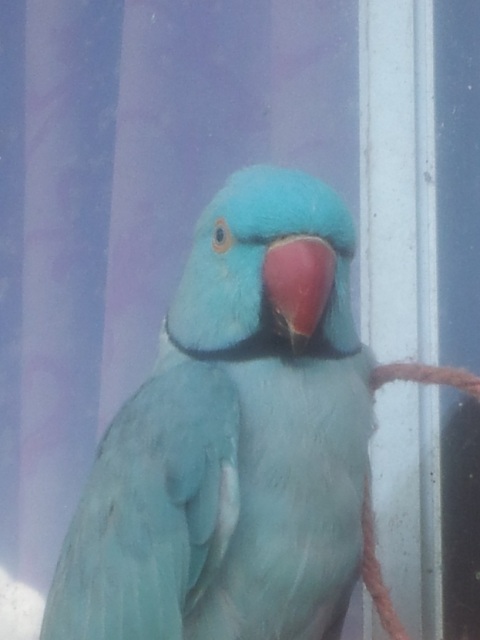 RE: Indian Ringneck probems
Question
Indy our Ringneck
Thank you for your he
RE: Indian Ringneck probems
Question
Indy our Ringneck
Thank you for your he
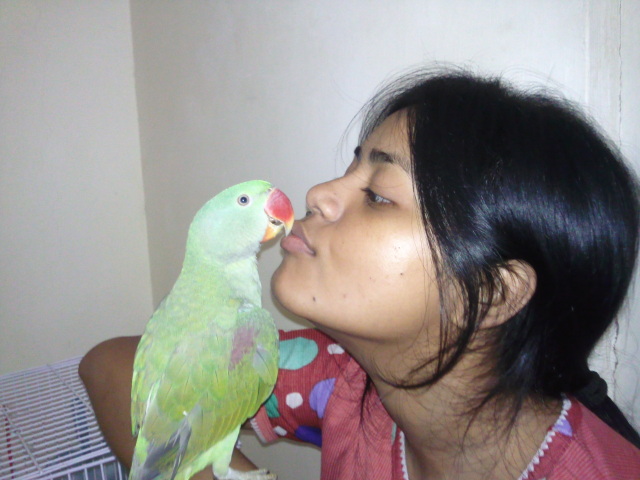 can i give my parrot chole(chana) called in hindi
Question
my little chaddi alexa
dear sir,
can give chan
can i give my parrot chole(chana) called in hindi
Question
my little chaddi alexa
dear sir,
can give chan
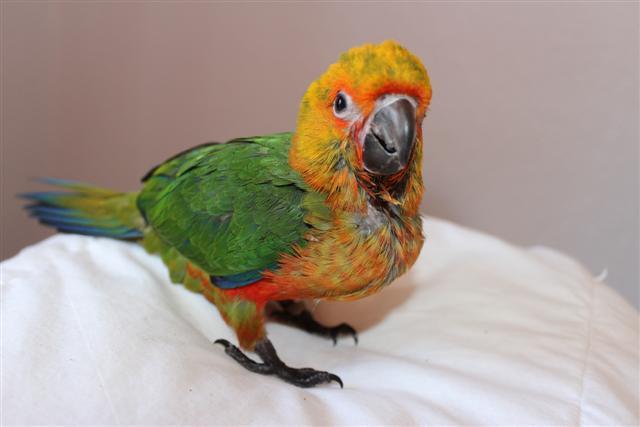 Jenday Conure Weaning?
Question
Castor the Conure
Hi
I have a 9 week o
Jenday Conure Weaning?
Question
Castor the Conure
Hi
I have a 9 week o
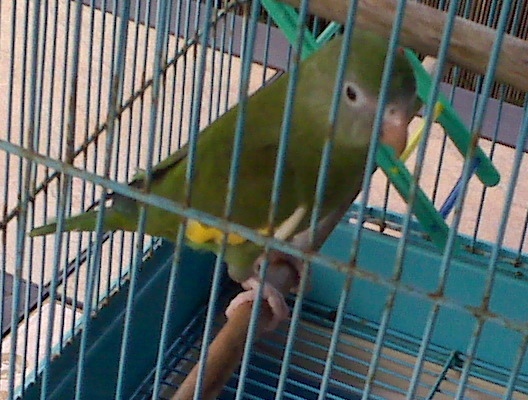 What type of parrot is this?
Question
Friendly bird
A week ago ths small parrot flew
What type of parrot is this?
Question
Friendly bird
A week ago ths small parrot flew
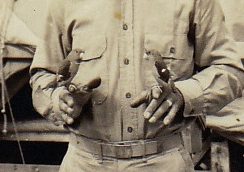 ID Birds
Question
Panama Birds
My uncle served in Panama in 1941
ID Birds
Question
Panama Birds
My uncle served in Panama in 1941